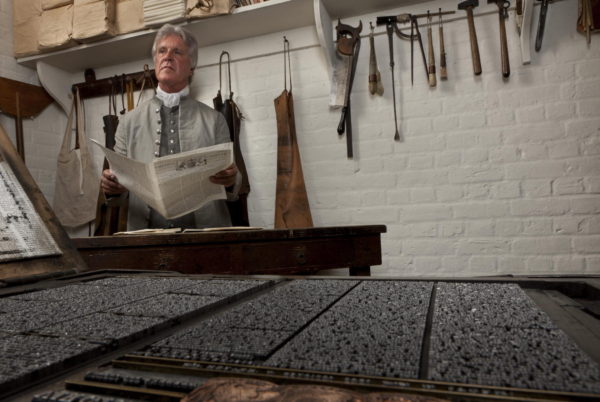
There goes Alexander Purdie, striding confidently down Duke of Gloucester Street, exchanging greetings, copies of the latest edition of his Virginia Gazette tucked under his arm. Arriving at King’s Arms Tavern to take his ease after a busy morning, what he doesn’t know is that he is about to be challenged by Mrs. Braxton.
Elizabeth Braxton is the wife of Carter Braxton, a signer of the Declaration of Independence. While her Patriot bona fides are secure, the reputations of her loyalist brothers have suffered. She believes Mr. Purdie is abusing the power of the press.
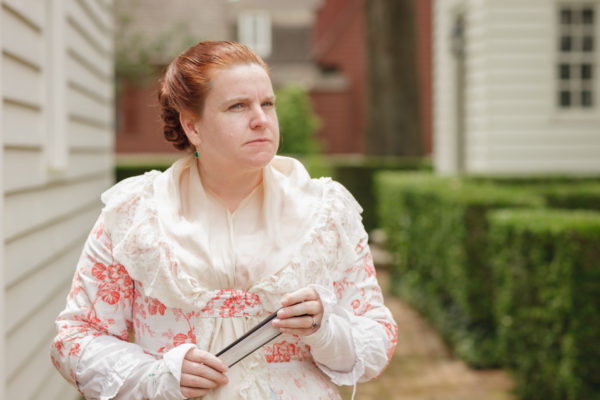
Alexander Purdie, the Scottish-born editor of the Gazette—well, one of them, anyway, for at one point there are three in circulation—sees himself as a truth-teller. He trusts his own sense of fairness.
Even a woman as socially prominent as Mrs. Braxton has to recognize that status isn’t everything, and that the Revolution is recalibrating society in ways they haven’t yet begun to realize. So she will take her complaint to Mr. Purdie, and perhaps make him appreciate the permanent damage the media can do.
Purdie, as you can imagine, sees the issue differently…
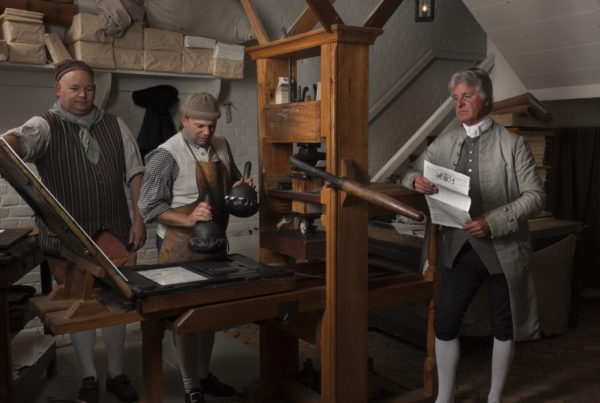
The issues they debate—the ability of the press to make or break a reputation, the public’s right to know, the standards of truth and the question of who gets to arbitrate such matters—are just as alive today.
On the eve of the vice presidential debate, join us in consideration of some of the big questions that speak to who we are as a people. Weigh in. And join us if you can, on the streets of Williamsburg, where you might encounter Mrs. Braxton or Mr. Purdie, or in one of our upcoming programs highlighting how these enduring debates continue to shape us as a people.
It Starts Here, every Thursday until Election Day in Hennage Auditorium, features a series of different issues and many different participants, including You, the People. This week, Oct. 6, we’ll be debating women’s roles in 18th-century civic and political life. As you can see, Mrs. Braxton may not have wielded the vote, but she certainly didn’t consider herself powerless.
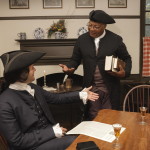
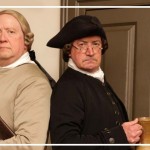
For a lady so concerned about the reputation of her Tory brothers, Mrs. Braxton is certainly risking her family’s good name, by going into of all places a TAVERN! ,Then,, to go UNESCORTED and sit at a table and take DRINK with a MAN, OTHER THAN HER HUSBAND….for shame! Mr Braxton needs to have a very sincere discussion with his wife lest people WILL talk. Despite her supposed patriotic bona fides perhaps this is a Tory habit inbred in HER family, Mr. Carter Braxton needs to control his wife..
In all seriousness, I completely agree with Mrs. Braxton. The press has a role to play in informing the public about events in their community. Still, I fear that media corporations are giving us less and less news, and more and more trivial pieces. I fear that as a nation we will become an uninformed populace with the demise of good newspapers.
Just shared your excellent post with my radio show’s FB page, Bill. We recently did an episode on the subject of “opening up” the libel laws, to borrow a phrase from one of our presidential candidates, which your readers might enjoy: http://ywc.podomatic.com/entry/2016-09-16T12_53_56-07_00
Both Mistress Braxton and Mr Purdie are correct. The media can ruin lives. The media has a duty to report facts. The media *can* report opinions, but unfortunately, it doesn’t often do so equally on all sides of an issue. While a person in the media may think he is opining fairly, or fairly choosing opinions to publish, his own biases and opinions will affect what he chooses, the prominence he provides each opinion, and the way he sets out the “facts” (which might not be facts at all, but hearsay and opinions.
The Revolutionary War was the first Civil War of the United States - see Allen, Thomas B. Tories. New York, Harper Collins 2006. Contrary to the belief of many modern Americans (thanks to the inadequate public education system), support for the Rebel cause wasn’t spread among the majority of colonials, nor was it spread evenly among the 13 colonies. Some newspaper editors encouraged rebellion (consider the print of the “Boston Massacre,” which was completely inaccurate), others did not - all based on their opinion.
Such bias continues to this day. My high school English teacher, Mrs Norris, who directed our student newspaper, recommended to her students this method for counteracting the sway of bias. She encouraged us to read about a story in a liberal paper, a conservative paper, and a paper that attempted to report without bias. She encouraged us to take the “facts” stated on an editorial page with the entire salt shaker. Yes, this takes quite a bit of time - but the citizen who truly seeks to be informed could simply use time doing this instead of watching the Kardashians, sporting events, or listening to Hollywood actors opine on late night television.